
 |
|
|
#1 |
|
Member
Join Date: Dec 2004
Location: Sint-Amandsberg (near Ghent, Belgium)
Posts: 830
|
These are three small african knives. Although they are small, they are fascinating :
1. A finger hook from the Karamajong in Tansania. What's special about this one is the fact it has a double hook. Most of them only have one hook. Can be a gruesome concealed weapon. 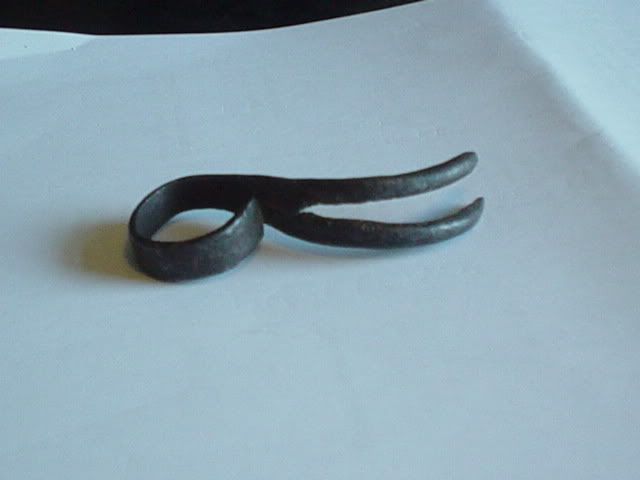 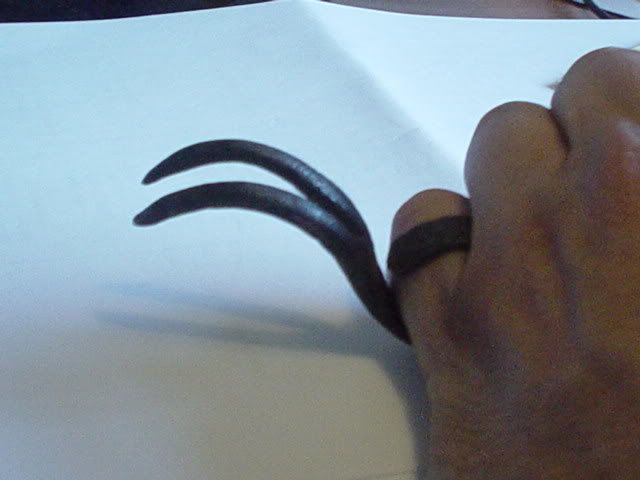 2. A small knife with ivory handle from the Lega or Leka tribe. (length : 23 cm) 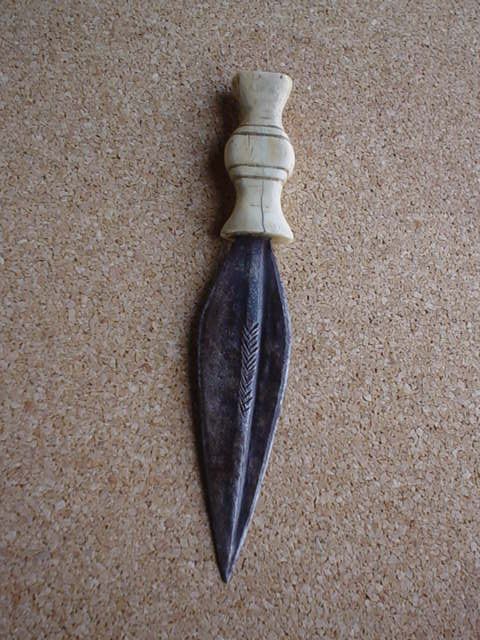 3. This is also from Africa. Don't know the exact origin. Lenght is 11 cm with a wooden handle (3,5 cm). The upper edge of the blade is sharpened. Perhaps someone else knows more ?  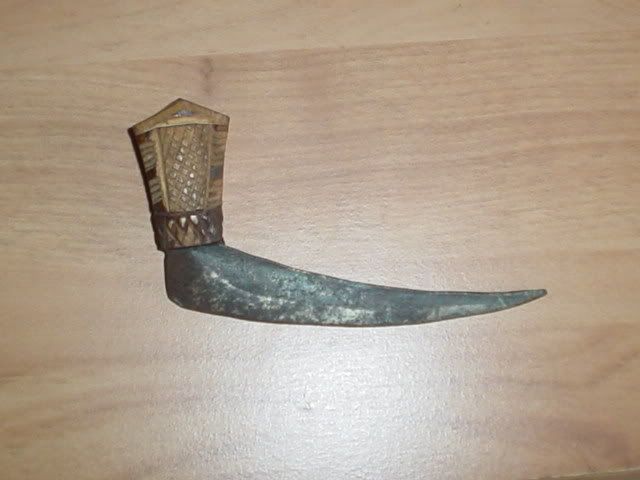
|
|
|

|
|
|
#2 |
|
Member
Join Date: Dec 2004
Location: What is still UK
Posts: 5,806
|
They are great! I really like the last one with the wood handle. They are a little like the Indian 'tigers claw' one of our members has one, a fleeting glimpse was shown some years ago while discussing some other subjet. Do you know if claw like weapons have any relation to the congo 'leopard men'? Tim
|
|
|

|
|
|
#3 |
|
Member
Join Date: Dec 2004
Location: What is still UK
Posts: 5,806
|
That small ivory handle knife might be an arm knife? This ivory handle Mangbetu Knife is 21cm long and from the scabbard looks as if it was intended as an arm knife. Tim
|
|
|

|
|
|
#4 |
|
Member
Join Date: Dec 2004
Location: Sint-Amandsberg (near Ghent, Belgium)
Posts: 830
|
The leopard men from Central Africa are quite something different. The fingerhook I showed is also used for eating and other daily tasks.
The leopard men were a secret society. A man asked to be intitiated into such a society. He would turn to a known chief of the society and offer him a goat or something else. He would then be taken to a secret place in the forest. Few people - besides the initiated - know what happened there. One thing is sure : the final test consisted in the murder of one of their parents or other relatives, or even one of their wives. Once initiated, the new member, called 'anioto' came under the guidance of a chief. Before attacking someone, a magical potion was drunk. The anioto dressed themselves up as leopards with a spotted hood. On one or on both hands, the leopard man wears iron claws. A claw consists of an iron rod with between 3 and 5 razorsharp blades. They put their fingers between the blades and tied the rod onto their forearms. They sometimes had a wooden stick in the form of a leopard's paw. They always operated in groups (minimum 2 persons). Their victims could be anyone (men, women or children). The victims were always attacked from behind. Their caritid artery was slit, but often other injuries were also inflicted. Parts of the bodies were taken to be eaten, as this gave strength to the anioto. Sometimes the eyes were also removed, to be used to prepare a potion with which the claws were treated. In this way, the weapons would 'see' in which direction they had to go to get to their next victim. The secret society of leopard men had 3 goals : - individual or collective revenge - a means of dominating people (used by religious or political leaders) - ritual murder (for example at the death of an important chief) Finally, it could also be seen as a kind of guerilla warfare. Weaker tribes could defend their territory against the stronger neighbours by means of terror. This info comes from the book 'Dodelijk Mooi' (Deadly beauty) on Central African Weapons. I've included also a picture from this book (p121). It shows some 'claws', a 'leopard's foot' and the bark cloth clothing these men used to wear. The biggest claw measures 46,2 cm. The weapons come from the Baali tribe in Congo and were collected before 1930. They are in the collection of the Royal Museum of Central Africa at Tervuren. 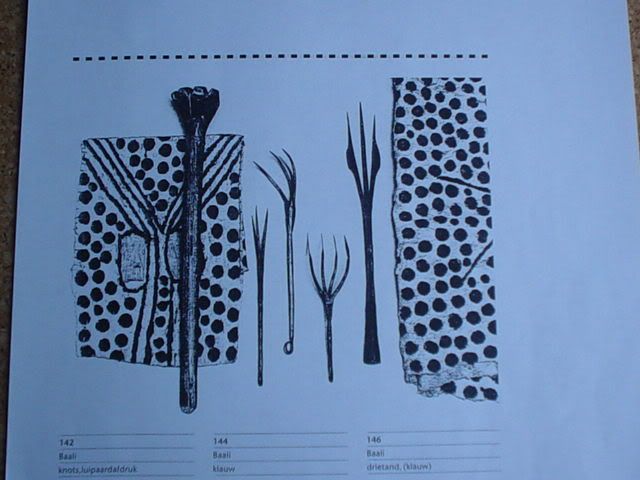
|
|
|

|
|
|
#5 |
|
Member
Join Date: Dec 2004
Location: Sint-Amandsberg (near Ghent, Belgium)
Posts: 830
|
Tim, these Mangbetu knives were never intended to be worn on the arm. They were worn, stuck in the belt. The smaller ones were used by women.
By the way, very nice piece. |
|
|

|
|
|
#6 |
|
Member
Join Date: Dec 2004
Location: What is still UK
Posts: 5,806
|
Fantastic!!! I feel 12 years old again having just watched a horror film. I will have trouble sleeping tonight

|
|
|

|
|
|
#7 |
|
Member
Join Date: Dec 2004
Location: Sint-Amandsberg (near Ghent, Belgium)
Posts: 830
|
 yeah ! Be sure to close your window. yeah ! Be sure to close your window.
|
|
|

|
|
|
#8 |
|
Member
Join Date: Dec 2004
Posts: 1,247
|
Neat knives. I like that finger hook for eating--perhaps someone can make a few for campers to use?
 Interesting parallels between the leopard society of Africa and the Kanaima "dark shamanism" practices of Guyana in South America. Obviously they didn't have metal claws, but the kanaima were in some ways "were-jaguars" who specialized in a pretty gruesome form of violent death (read the book Dark Shamans --I am not repeating it here, as it's way off topic). This is making me wonder whether our stories of werewolves had a basis in similar practices in Celtic and early Medieval times... F |
|
|

|
|
|
#9 |
|
Member
Join Date: Dec 2004
Posts: 175
|
Freddy:The last knife you posted is very similar to a knife I had a few years ago,I think it was identified as an 'arasa' from the Congo?I think they are work knives.
|
|
|

|
|
|
#10 | |
|
Member
Join Date: Apr 2005
Posts: 3,254
|
Quote:
How are they hold when used for eating? Thanks! Kai |
|
|
|

|
|
|
#11 | |
|
Member
Join Date: Apr 2005
Posts: 3,254
|
Quote:
Regards, Kai |
|
|
|

|
|
|
#12 | |
|
Member
Join Date: Dec 2004
Location: Sint-Amandsberg (near Ghent, Belgium)
Posts: 830
|
Quote:
Besides being used as a weapon and for eating, a Suk (Pokot) chief greeted his subordinates by allowing them to grasp the hook. I put it on my pinkie because my fingers are too thick. 
|
|
|
|

|
|
|
#13 | |
|
Member
Join Date: Dec 2004
Location: Sint-Amandsberg (near Ghent, Belgium)
Posts: 830
|
Quote:
You are of course right. I just couldn't find the right name for this kind of knife. |
|
|
|

|
 |
|
|